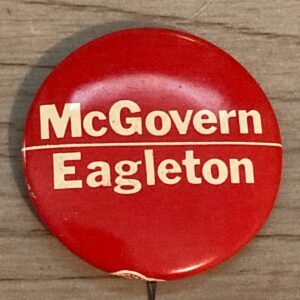We all make mistakes. They’re an unpleasant fact of life.
Then there are those bad calls that go far beyond mere missteps, errors in judgment so egregious they become hallmarks of sheer stupidity. One of the biggest such debacles of all time occurred 50 years ago this month.
This is the story of the biggest blunder in American political history.
It was decision time for George McGovern in July 1972. The South Dakota senator had just clinched the Democratic presidential nomination after a grueling primary campaign. With his party gathering for its national convention in Miami Beach, Fla., he would soon announce his running-mate.
The problem was, McGovern didn’t have one. He had been so focused on securing the nomination he apparently hadn’t given much thought to whose name would appear alongside his on the ballot.
To a certain extent, that was understandable. The 1972 Democratic primary season had been an experiment in disorganized democracy. Reacting to their disastrous 1968 convention in Chicago, Democrats overcompensated by flinging the delegate selection process wide open, creating a far more liberal base focused on highly-controversial issues of the day like abortion, gay rights, radical feminism, legalization of pot, and an immediate end to the Vietnam War. Moderate and conservative Democrats were shunted aside by a cadre of young activists that included young Bill and Hillary Clinton and overseen by campaign manager and future U.S. Senator Gary Hart.
Miami Beach promised to be a nationally televised parade of the unconventional posing as a political convention.
Amid this chaotic backdrop, McGovern prepared for his coronation with no running mate in sight. And as his attention turned to filling out the ticket on the convention’s opening day, he was also facing a colossus.
Richard Nixon and his Republican Party were poised for victory that November. Polling showed McGovern’s best (and perhaps only) chance for overcoming the long odds was running with the younger brother of the man who had defeated Nixon for president in 1960, Sen. Edward Kennedy. As a Catholic, he shored up the ticket on the abortion issue, and he carried the Camelot legacy from Jack Kennedy’s 1,000 days in the White House.
There was just one problem, and it was a biggie: Ted Kennedy wanted no part of it. He didn’t want to go down with the Titanic, and his presidential ambition didn’t include the word “vice.” So, it was a polite “no” when McGovern offered him the number two spot.
With the convention underway, McGovern invited Sens. Gaylord Nelson (D-Wis.) and Abe Ribicoff (D-Conn.) to run with him. Once again, it was, “Thanks, but no thanks.”
Time was running out. In desperation, McGovern turned to 42-year-old Missouri Sen. Thomas Eagleton. A devout Catholic with strong ties to organized labor, he was liberal without being too liberal. And he had the best qualification of all: When McGovern asked Eagleton to run with him, he said, “Yes.”
Their phone conversation lasted a mere two minutes. And though he didn’t know it at the time, McGovern had just made the biggest blunder of his career.
The McGovern-Eagleton ticket was announced on July 12. By early the next week, whispers were spreading through Washington and making their way onto network TV and major daily newspaper newsrooms. Eagleton had a dark secret.
Years before, he had experienced severe depression and had received electroshock treatments for it.
The news hit like a bombshell. This was the middle of the Cold War, after all, and the threat of nuclear war was very real. Americans wondered whether having someone who’d suffered a form of mental illness with his finger on the button was a good idea, should it come to that.
To his credit, Eagleton acknowledged everything and didn’t hide from it. To his discredit, McGovern handled it as poorly as possible. First, he said he stood behind his running-mate (in his words) “1,000 percent.” With the heat growing, McGovern then stalled for time and tried to get Eagleton’s medical records. He couldn’t. The “Dump Eagleton” chorus grew louder daily until reaching a crescendo of “Hallelujah Chorus” proportions.
Finally, McGovern talked with two of his running-mate’s psychiatrists. That persuaded him enough was enough. After a mere 18 days on the ticket, Eagleton withdrew.
Again, the Democratic standard-bearer had a tough time finding someone to run with him before finally settling on Sargeant Shriver, the first director of the Peace Corps and husband of Ted Kennedy’s sister Eunice.
Exactly 99 days later, McGovern-Shriver lost 49 states to 1 against Nixon-Agnew in one of the biggest landslide defeats in history.
So, where did McGovern blow it? He didn’t examine Eagleton’s personal history beforehand. Amid the wholesale confusion that was the ’72 Democratic National Convention, his campaign never conducted a background check.
It is a mistake that hasn’t been repeated in the 50 years since. VP selections are now vetted so thoroughly, the process ranks somewhere between having a root canal and being audited by the IRS.
Too bad for McGovern that Ronald Reagan’s favorite adage, “Trust, but verify,” wouldn’t come along for another 15 years.





